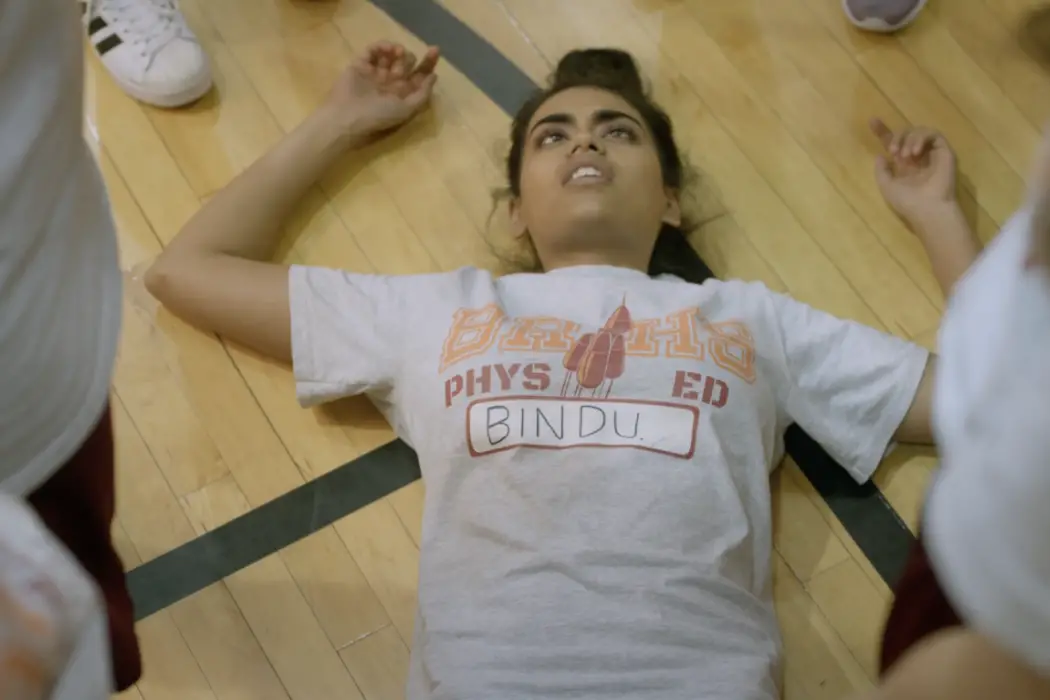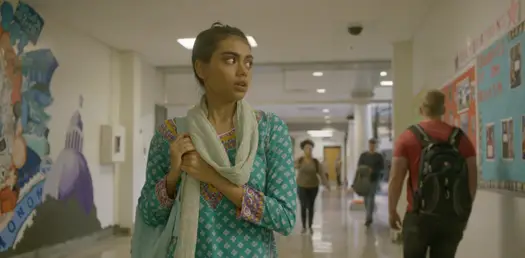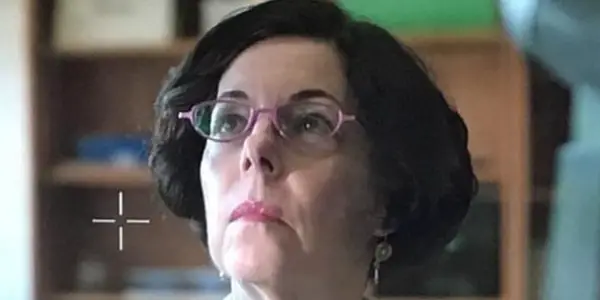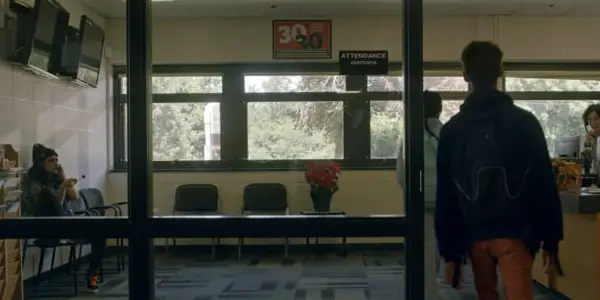THE MISEDUCATION OF BINDU: A Worthy Coming-Of-Age Story

Andrew Stover is a film critic/writer from the Chicagoland. His…
Coming-of-age movies are released every year, most of which follow a male’s perspective. But every perspective should be taken into consideration, chiefly because almost everybody, at one point during high school, felt awkward, misplaced or exploited. Although scant in existence, there are coming-of-age stories that follow the misadventures of a teenage girl, roaming the outskirts of high school and developing fears of acceptance and self-image — fears that are both vaguely alike and overtly distinct when compared to the male perspective.
Trudging through high school is a bumpy road of discomfort: Debilitated self-esteem and self-worth are common. Friendships evolve into romance, while others gradually deteriorate. Gossip can spread like the plague. Bullying is generally expected in some form. And puberty only enlarges what would already be the four most unquiet years of your life.
Some of the most recent female-helmed coming-of-age projects include Olivia Wilde’s Booksmart, Greta Gerwig’s Lady Bird, and Kelly Fremon Craig’s The Edge of Seventeen. With Prarthana Mohan’s The MisEducation of Bindu, the coming-of-age perspective is vitalized by Bindu (Megan Suri), a 15-year-old Indian American high school student who’s having problems at home, and is having a grueling time transitioning to an American public school. Bindu lives under her mother’s (Priyanka Bose of Lion) roof, and she’s forced to reside with her well-intentioned step-dad (David Arquette of Scream & Never Been Kissed). Bindu yearns for simpler times — times in which she was homeschooled and not bullied by peers, and times in which she can’t hear her mother and step-dad having intercourse in the next room.

Every morning, Bindu begs her mother to sign a permission form to take a Spanish test, the only credits she needs to graduate high school, but her mother refuses to sign the form, convinced Bindu should stay in public school and take in the whole experience. The experience of high school definitely varies, but friendships do commonly blossom. After being bullied by the typical enforcers (throwing quarters at her, calling her a “whore” and vandalizing her locker), Bindu accidentally runs into Peter (Phillip Labes), a lovable band geek.
Growing increasingly annoyed with her ill-natured classmates, Bindu forges her mother’s signature on the form and attempts to take the Spanish exam to test out of school. Unfortunately, the exam costs $57.00, and she doesn’t have that kind of cash, but she’s determined to get the money in before 7th period. Whether it be lying to her step-dad, charging money to do homework or smoking marijuana, Bindu and her new friend Peter will explore all of the monetary possibilities in the gossip-riddled hallways of high school.
The Tribulations Of Adolescence Anchored By A Novel Perspective
Being an Indian American immigrant teenager, Bindu is still trying to find her place in America. Her home life now includes Bill, her amiable if slightly unaware step-father, who’s stuck in a first-grade mentality: he tells Bindu that the boys who relentlessly tease her must secretly like her. In my life, I only moved a town over; Bindu, on the other hand, moved to another country, leaving the people who spoke her language and understood Indian culture behind. Leaving the comfort of her home, letting her step-dad into her life and wrestling with adolescence, all of it holds dire weight — but that doesn’t mean you can’t find any humor in the thorny situations. Cognizing all of the hardship adolescence entails, the cringe is insufferably innate.
The title sequence is formulated through close-up shots of Hindu-inspired memorabilia (including dolls and a magnet of an elephant, who may be Ganesha, a god known for being the remover of obstacles). Bindu arrives on-screen as a timorous teen, who’s watching a Bollywood musical production and immersing herself to the tune — singing along and gently moving to the beat alone in her room. All of the memorabilia and her self-contained exuberance depicts her love for India, but her singing session is interrupted by her mom and step-dad getting it on in the next room. It’s awkward and distracting, and possibly contributes to sleep-deprivation, but school isn’t any better.
The camera steadily follows Bindu through the hallways of high school. Like an intrusive bystander, Dani Sanchez-Lopez’s cinematography is intimate enough to highlight Bindu’s perspective but distant enough to bring us into the hallways of the school as a compelled bystander, while still being able to empathize with her. When she’s being chased by bullies, the camera pinpoints her fear while keeping the camera sustained. The camerawork is persistently smooth.

Bindu’s outlook is restricted by cultural boundaries, but she does speak English and she attempts to fit in. In a bold effort to adorn her image, Bindu slathers a prolific amount of make-up on her face, impelling her cousin to fix it up a bit. Registering Peter’s advice on payback, Bindu gains the confidence to confront her bullies and insult them, uttering the hilarious but poorly executed line, “Why don’t you go save some money for your…for your castration surgery.” Bindu throws some shade, but all of her strives to alter her appearance and radiate more hostility end up bootless.
Now incredibly frustrated with the nightmares of public high school, Bindu forges her mother’s signature on the permission form to take the Spanish exam, the last credit she needs to graduate high school. But academic success never comes for free, so the Spanish test has a fee of $57.00. Desperate to escape the hell hole that is public high school, she ventures on a precarious journey across the high school landscape, scavenging for money from classmates. In high school, it’s normal for a teenager to have a fractured self-image and self-esteem. Bullying is another gear steering the collapse of one’s self-worth. But as Bindu converses with each high school personality (a classmate who perpetuates rumors, a sociable stoner, a nerd worried about his GPA and even her ruthless bullies), she relishes some innocuous rebellion and develops a voice, unafraid of backlash.
Bindu is endearingly innocent, whereas her peers are more well-versed about all things involving sex. As a teen, there’s a lot you discover about yourself, and Bindu knows much less than the typical teenager — not like that calls for shame, it just simply means it’ll be more arduous to connect with the high school crowd. No matter how much Bindu’s mother tries to protect Bindu and preserve her purity, knowledge is important and it prevents them from agreeing to something they know very little about just to fit in.
Beautifully Envisioned & Delightfully Offbeat
The MisEducation of Bindu assumes the comedic hallmarks of Napoleon Dynamite by how it pokes fun at the sincerity of how teenagers act and what they think about. Alongside Kay Tuxford, Prarthana Mohan concocts a script that treats the characters like teenagers, bestowing them with natural dialogue that’s as charged as it is salacious. Mohan’s execution is faintly quirky (at one point, Bindu smokes some weed, resulting in a rollicking fantasy dance sequence). Aaron Gilhuis’ drum-infused score also toes the line of being kooky and unnerving. Bindu’s confrontations with a number of classmates can be peculiar or unpredictable, and the drum beats are periodically brisk or measured, amplifying the aura of the scene.
Being a victim of bullying, it’s easy to sympathize with Bindu. “It just seems like people just don’t like me,” is something Bindu tells a teacher, and the teacher responds by saying she just has to find her tribe. But being bullied is one of the prime reasons why Bindu wants to test out of school. In actuality, bullying can result in self-harm or suicide. Bullying is an issue, and it’ll likely be an unwavering issue, but it’s how the victim and bystanders respond to it that makes all the difference. Fortunately, for Bindu, with the help of Peter, she attains the fortitude to overcome the bullying. Oh, and she also essentially tells them to “f*ck off” in one of the more crowd-pleasing moments in the film. Generally, I don’t condone swearing (largely in public), but it was an in-the-moment reaction, and it serves as the beginning of Bindu finding and using her voice.

In her first leading role, Megan Suri is perfectly cast as Bindu, replicating all of the discomposure that comes from transitioning from homeschool to a public high school, as well as adjusting to her new life in another country that holds dissimilar customs. Suri emanates a kind of desolation and disorder that’s mainly displayed through her eyes and jittery body language. As for Bindu and Peter’s friendship, Philip Labes and Suri have winning chemistry, and their friendship is heedfully handled and explored. Priyanka Bose convincingly plays Bindu’s stern and overprotective mother, but deep down, she has a big heart. The biggest name of the picture is David Arquette, and he brings a good-humored and purposeful presence as Bindu’s step-dad, who’s trying the best he can to connect with Bindu.
It isn’t until a later scene in which Bindu is speaking with Peter, high as a kite, that her discontent is more vividly expressed: “Bindu, what are you going to do when you get out of here?” “Convince my mom to let me go home.” Homes begin somewhere, usually in a house that occupies a snapshot of a family’s history. Then again, houses are merely concrete structures, it’s the memories and the people who upkeep a home. Even if it means moving to another country, a home is associated with the people who make you feel guarded and loved. Albeit Bindu is fixated on leaving school and returning to India, Mohan envisions a future for Bindu that embraces the people and relationships rather than the place.
The MisEducation of Bindu Is A Worthy Addition To The Coming-Of-Age Genre
You always remember where you came from, but the people in your life, and the relationships you create, along the way, help conserve the essence of a home. The MisEducation of Bindu follows Bindu, an Indian American girl caught in between girlhood and womanhood, while trailing the hallways of a public high school. Piercing stares are always on you (or maybe you just tend to think they are), and muted whispers are always more forceful and raucous than screams. For Bindu, her viewpoint is drawn with cultural gravity, relatability and sticky laughs, woven with empathy and understanding.
Prarthana Mohan’s coming-of-age dramedy arranges Grade-A talent, on-screen and behind-the-screen. The teens speak and react like teens, the hilarity is low-key, and Bindu’s journey through adolescence is emotionally potent. Mohan supplies a rare cultural narrative and an innovative point of view to the wonted coming-of-age stories released every year. Once again, school is in session, but the lesson plan is eminently fresh, proving to churn out quirky, worthwhile results.
What is your favorite coming-of-age movie? Let us know in the comments!
Does content like this matter to you?
Become a Member and support film journalism. Unlock access to all of Film Inquiry`s great articles. Join a community of like-minded readers who are passionate about cinema - get access to our private members Network, give back to independent filmmakers, and more.
Andrew Stover is a film critic/writer from the Chicagoland. His film & TV reviews can be found on Film Inquiry & Film Threat.












